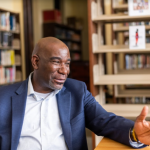Birmingham City Schools Superintendent Mark Sullivan can continue in his role for at least another three years, board members voted Tuesday. (File)
” data-medium-file=”https://www.birminghamtimes.com/wp-content/uploads/2024/11/MarkSullivan1114-1-300×201.png” data-large-file=”https://www.birminghamtimes.com/wp-content/uploads/2024/11/MarkSullivan1114-1.png” tabindex=”0″ role=”button” />
By Rebecca Griesbach | rgriesbach@al.com
Birmingham City Schools Superintendent Mark Sullivan, who led the district through the pandemic and has been praised nationally for recent gains, can continue in his role for at least another three years, board members voted Tuesday.
His contract, which comes with a $300,000 salary and two additional vacation days, will position Sullivan among the state’s highest earning superintendents.
His salary for the current fiscal year is $274,482, according to state data.
Birmingham school board members approved the contract renewal on a 6-2 vote at a Tuesday board meeting, but the contract will still have to be reviewed and signed by the board president, as well as Sullivan and a representative. If finalized, Sullivan will make more than State Superintendent Eric Mackey, who earns about $285,000 per year. Creshal Threadgill, Mobile County’s superintendent, became the first superintendent to make more than $300,000 last year.
“This has been a very difficult four years,” Sullivan said, remembering staff members who died during the pandemic and the difficulties of providing a safe environment for students to learn and regain lost ground.
“Moving forward, we are committed to making sure that our school system is absolutely the best district that it can be. We have a lot of great things on the horizon to improve our district, and we’re nowhere near where we want to be, but we’re a long way from where we used to be.”
Sullivan has led the district since August 2020, following nearly three decades of service as a teacher and administrator. His starting pay was about $231,000, according to state data.
Sullivan received an overall score of 3.57 out of 4, or an “above expectations,” on his most recent evaluation held on Sept. 10. The district recently saw a 19 percentage-point jump in reading scores, and has seen success with creative interventions such as intersessions during school breaks. Sullivan will head to Harvard University next week, officials recently announced, to co-teach a class centered on the school district’s achievements.
“Visible” And “Hands-On”
Community members on Tuesday described Sullivan as a “visible” and “hands-on” leader who has been attentive to concerns and always made an effort to check in on students and staff.
“Our schools are moving forward,” said parent Hazel Boykin, to applause. “He knew there was a problem in the school system, but thank God, he brought it out.”
Typically, school superintendents are evaluated based on surveys of board members and direct reports. Birmingham’s board recently tweaked the evaluation process to also consider student achievement.
“There’s more scrutiny than what a lot of other school districts deal with in the state,” Board President Jason Meadows said after the evaluation, adding a moment later “We have a long way to go, a long way to go, but there’s a lot of hard work going on.”
The raise comes as schools across the state grapple with the end of pandemic relief spending. In many places, districts are cutting staff to stay in budget.
Good Financial Standing
Birmingham schools are currently in good financial standing, leaders say, and are starting to see enrollment numbers improve after a long decline. Officials anticipate leaning on local funding to continue key intervention programs and will continue to offer stipends for special education teachers and other hard-to-fill areas during the 2025 fiscal year.
Two of the opposing board members, Neonta Williams and Derrick Billups, praised Sullivan for his progress but said they didn’t believe they had enough data to warrant the increase in pay.
Williams said some staff members feel frustrated and disengaged, and said she would like to see more accountability measures considered in the next evaluation.
“There’s no question, I support Dr. Sullivan,” Billups said. “But for me when I look at the process… I think we’ve been very inefficient, I don’t think we’ve had the level of dialogue that’s necessary or looked at the data to support some of the actions to move forward.”
“It seems a little mind-boggling to me when I think about our teachers, and our certified staff, and their step grades, they get less than 1 percent per year,” he added.
Other board members said they felt that an increase was what Birmingham needs to stay competitive with other large districts.
“You pay people in the direction that you want them to go, and that’s the approach that I take and that’s where I’m looking to go tonight, so I respectfully disagree,” Sherman Collins Jr. told the board Tuesday evening.











